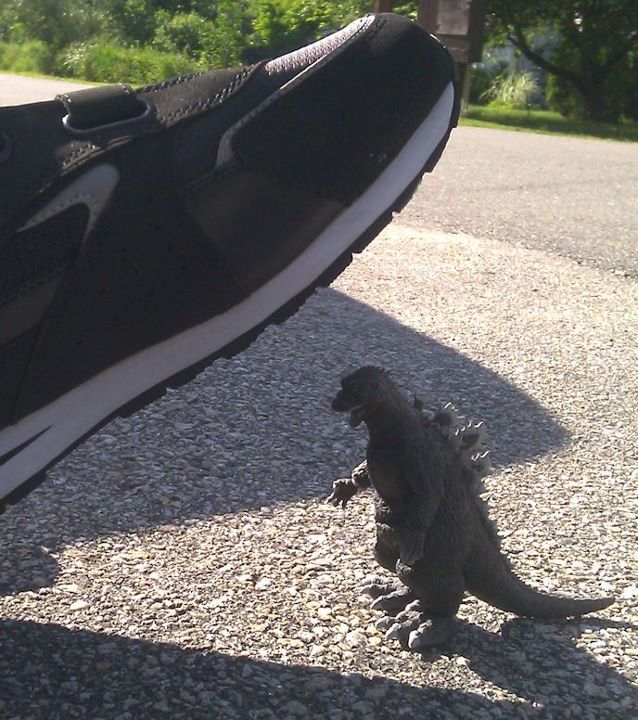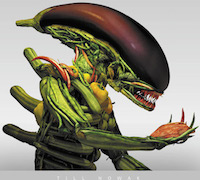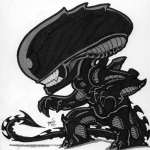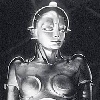Previously, I had written that, “Legendary's Godzilla will neither be the 'be all, end all' movie of the series, nor will it tarnish it,” but rather it would, “add to an already impressive legacy.” They were cautionary words for fans who misinterpreted the series as a 59 year practice round for this singular release. Indeed audiences were greeted with a film that carries much of the same charm, energy and weaknesses as the bulk of the series. Fans weren't given a movie that disrespectfully tried to apologize for the franchise, à la 1998-- They were given a Godzilla movie.
The film has been praised and criticized for being many things. While Steve Ryfle condemns it for 'whitewashing'*, David Erhlich praises it as the first post-human blockbuster.** Others use Godzilla as a Christ analogy.*** Good, bad or indifferent I don't fully agree with those takes. They're not without credence, but they miss the basics for their analysis... it's a Godzilla movie! For years I've sat in quiet solace knowing if Hollywood would just crank out a film reminiscent of the series fans love it would be successful. Being a Godzilla film automatically opens it up for sociological interpretation and world event therapy. Social dialogues are prevalent in nearly every entry in the series, regardless of quality, and that's where the comments of post-human ideas and Christ-like debate come from. Not because it's a big-budget production, but, again, because it's a Godzilla movie.

Effective commentary is measured in the timeframe it's birthed; the best films in cinema are aged with abbreviations of their respective eras. Director Gareth Edwards was wise to keep his man-versus-nature theme prevalent over that of nuclear proliferation. If 2001's Godzilla, Mothra, King Ghidorah: Giant Monsters All-Out Attack showed us anything it's that the nuclear message isn't very strong anymore-- Which is why director Shusuke Kaneko focused on using Godzilla as a metaphor for generational gaps and the dangers that come from forgetting history. Edwards, likewise, is cautious to fill the movie with themes that are less relevant, but maintain an undercurrent of Godzilla's original protests.
For example, there's Dr. Serizawa's (Ken Watanabe) warning to Adm. Stenz (David Strathairn). In one of the film's more interesting beats Serizawa shows Stenz his father's pocket watch stopped the morning of Hiroshima's destruction. (Watanabe's Serizawa looks about twenty years too young to have survived Hiroshima himself, but it's never specified if his father actually died there. In any case, to linger over the inconsistencies is to miss the forest for the trees.) William Cox said, "Time is free, but it's priceless …. Once you've lost it you can never get it back.” Serizawa's warning is the most direct connection to the horrors of atomic devastation, but it's in and out before it becomes ham-fisted; his watch a reminder of a world where time stopped. Serizawa understands he will never find that time again.

The nuclear metaphors are atomosophobia “lite” compared to the 1954 original. Much of the new film reflects on nature's effect on modern civilization. Its images work like Cloverfield's visual calls to 9/11. Here there are obvious connections to the 2011 Fukushima Daiichi nuclear reactor meltdown caused by the Tohoku earthquake triggered tsunami. While the MUTO (Massive Unidentified Terrestrial Organism) sparked memories of the Fukushima disaster, using the fictional setting of Janjira, Godzilla's Hawaiian entrance imitated the tsunami.
Is it callous to use these images in a monster movie? Hardly. Rod Serling created The Twilight Zone as an outlet for stealth social commentary and the original Godzilla was used for similar reasons. In its later years the Godzilla series branched from its nuclear themes: Godzilla vs. Hedorah (1971) tackled Japan's tripling emissions of nitrogen dioxide, carbon monoxide and sulfur dioxide that created two major pollution diseases. (1) Godzilla vs. King Ghidorah (1991) used the monsters to illustrate issues with unchecked capitalism and runaway nationalism, inspired by Japan's late 80s “bubble economy.” (2) Edwards used Godzilla to illustrate how today's technologically savvy world can still be humbled by nature.
“Nature has a way sometimes of reminding man just how small he is.” Martin's (Raymond Burr) words, from Godzilla 1985, punctuated an unstoppable Godzilla that was likened to a natural disaster. I think many audiences expected something similar with Edwards' iteration. The misleading ads indicated a Godzilla similar to the 1984 production. Instead Godzilla plays the role of an anti-hero, (with more heroic leanings) but man still believes they can/should stop him and his mission. Capt. Hammond (Richard T. Jones) postulates the monsters will follow an armed nuclear warhead and their existence will end with its detonation. Of course this fails spectacularly and “nature” maintains its course with a rumble between Godzilla and the MUTOs. Just as no one could stop the Tohoku earthquake's tsunami from causing a nuclear meltdown, Edwards treats Godzilla's hunt for the MUTOs with the same reverence and inevitability. It's the series' most rampant vision of nature's wrath; instead of using Godzilla as a mindless drone to embody, for example, a twister's unpredictability he is the result of nature's collateral-- The metaphoric tsunami pushed into action by an earthquake. (Represented by MUTO, no less.)

The best of the Godzilla series not only uses its monsters as commentary for present day events, but indirect reflections of its characters. Edward's film fails at utilizing all of its characters effectively, but it shines at connecting its title creature with the journeyman, Ford Brody (Aaron Taylor-Johnson). Ford's mission is set by his late father, Joe (Bryan Cranston): He's trying to get to his family. As a soldier, however, he takes it upon himself to stop the MUTOs from reproducing. (Poetic justice for his father's death.) Likewise, Godzilla is a soldier on a mission to restore “nature's balance.” Much has been made of the moment where Godzilla and Ford make eye contact. Younger fans like to runaway believing Godzilla recognized Ford and later came to save him. Amusingly, I think that's acceptable for their age group; otherwise I feel the moment shows a thematic recognition of two tired, worn soldiers. Ford stood in awe of the fatigued Godzilla and the King of Monsters paused briefly at the limping human. It's not a cognitive connection, but one that tied two characters on the same narrative path. Later, with their missions completed, both Ford and Godzilla fall to exhaustion. The horizontal camera angles suggest a link between the battered soldiers and their acceptance of the rules of war; as they say on Game of Thrones, “All men must die.”
I don't believe the journeyman/soldier parallel between Godzilla and Ford is completely satisfying, but it effectively echoes stories and visuals seen in previous films: The peaceful Katsura and Titanosaurus being manipulated into killing machines from Terror of MechaGodzilla (1975). Dr. Shirigami's undying love for his daughter misplaced through Biollante's birth in Godzilla vs. Biollante (1989). Outside of the Godzilla series, in Gamera 3: The Revenge of Iris (1999), young Ayana sides with Iris in a joined hatred for the super-turtle. Although his use of the cast leaves something to be desired, Edwards' attempt at weaving characters with monsters represents an understanding of one of the series' finest traits.

Although Godzilla has all the marks of a true Godzilla movie it comes with franchise weaknesses as well. Characters, specifically Dr. Serizawa and Elle Brody, have little or nothing to do with the final act. This is a large, re-occurring problem found in most of the 1990s movies. And although most of these films have characters, typically scientists, that are used as the monsters' expositional mouthpieces, (in this case Dr. Serizawa and his completely useless assistant Dr. Graham, played by the insultingly underused Sally Hawkins) I invite filmmakers to break tradition and give these archetypes something else to do.
Other unique traits that come under fire is Edward's decision to kill off the film's most engaging character before the second act, Joe Brody, and keep Godzilla out of sight for the first hour. The monster battle cutaways have also been a point of contingency. I don't take any issue with the monster footage. I thought the balance of action was one of the stronger aspects of the film and keeping Godzilla offscreen elevated his god-like status above the oft seen MUTOs. Meanwhile, the cutaway to Ford's son watching Godzilla on TV struck me as an amusing nod to fans who grew up watching the films on television. Cranston's omission from much of the movie is far more objectionable. The excuse that Edwards and his writers couldn't find a way to keep the most interesting character in the movie smacks of contractual obligations or weak writing.

Yet Edwards manages to answer every flaw with a vision that is not only unique to the series, but many modern blockbusters. For example, Godzilla mercifully dispenses with being another origin story. Summer after summer provides the next big superhero with a man vs. world premise inevitably putting him into a costume. I was happy that Edwards glossed over Godzilla's genesis with a stellar opening montage. (Although, admittedly, later exposition could have been trimmed down.) After all, Godzilla has had thirty films to his name in sixty years. If you don't know what he is by now you likely didn't make it this far into the article.
And then there was the consensus. At the end of every day Godzilla will continue to be a powerfully entertaining movie that includes everything a Godzilla film should have-- Strong social themes punctuated by rousing monster action and worthwhile character dynamics. For all its flaws Edwards rebounded with a rare, notable love of old-school, less-is-more filmmaking. More importantly he understands the Godzilla series. It's not about over-reaching spectacle, dark/grim apologists or tacky, western futurism. Like a lot of science fiction it's a smokescreen for larger issues. At worst it's a fun romp. Edward's interpretation does not represent the best or the worst of the series, but it's rightly a Godzilla film. That's a higher compliment than a great many movies will ever receive.

Follow GMAN on Twitter @GMANonScified
------
*Whitewashing Godzilla - Steve Ryfle
**Godzilla: The first post-human blockbuster - David Ehrlich
***Of Godzilla... and God - Tom Nash
(1) Japan’s Pollution Diet - Alexandra Harney
(2) Japan's Bubble Economy of the 1980s - Jesse Colombo



















